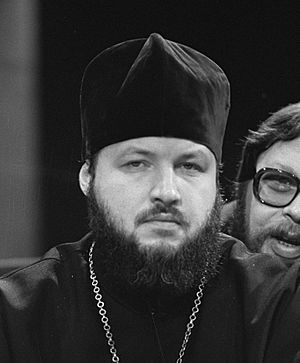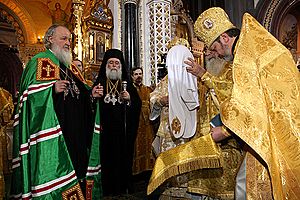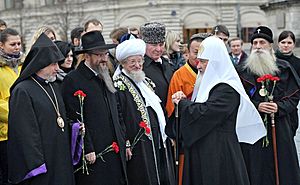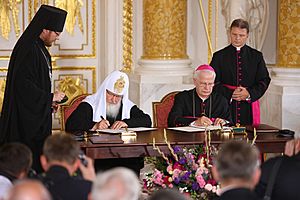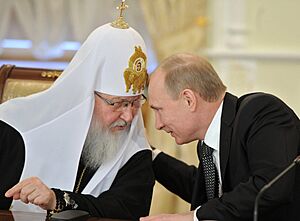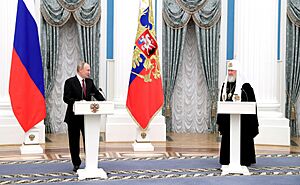Patriarch Kirill of Moscow facts for kids
Quick facts for kids Kirill |
|
|---|---|
| Patriarch of Moscow and all Rus' | |
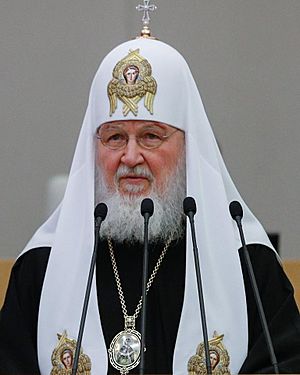
Kirill in 2023
|
|
| Native name | Кирилл |
| Church | Russian Orthodox Church |
| See | Moscow |
| Enthroned | 1 February 2009 |
| Predecessor | Alexy II |
| Orders | |
| Ordination | 7 April 1969 |
| Consecration | 14 March 1976 by Nikodim (Rotov) |
| Personal details | |
| Birth name | Vladimir Mikhailovich Gundyayev |
| Born | 20 November 1946 Leningrad, Russian SFSR, Soviet Union |
| Denomination | Eastern Orthodox Church |
| Alma mater | Leningrad Theological Academy |
| Signature |  |
| Coat of arms | |
| Styles of Patriarch Kirill |
|
|---|---|
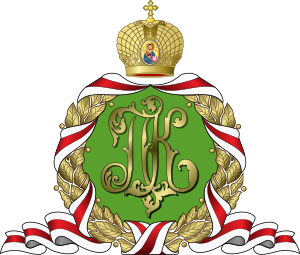 |
|
| Reference style | His Holiness |
| Spoken style | Your Holiness |
| Religious style | Patriarch |
Kirill (born Vladimir Mikhailovich Gundyayev on 20 November 1946) is a very important leader in the Russian Orthodox Church. He is known as the Patriarch of Moscow and all Rus', which means he is the main leader of the Russian Orthodox Church. He took on this role on 1 February 2009.
Before becoming Patriarch, Kirill was an Archbishop and later a Metropolitan in charge of areas like Smolensk and Kaliningrad. He also led the church's department for talking with other churches and groups. He has been a key member of the church's main council, called the Holy Synod, since 1989.
Kirill has a close relationship with Russian leader Vladimir Putin. He has even called Putin's time in charge "a miracle of God." During his leadership, Kirill has worked to bring the Russian Orthodox Church closer to the Russian government. His relationship with Bartholomew I of Constantinople, who is another important leader for Eastern Orthodox Christians worldwide, has sometimes been difficult.
Kirill has spoken about the Russian invasion of Ukraine. He has said the conflict is a fight against "forces of evil." Some church leaders in other Orthodox Churches have disagreed with his statements. Bartholomew I said that Kirill's support for the war was "damaging to the prestige of the whole of Orthodoxy."
Contents
Early Life and Church Path
Kirill was born Vladimir Mikhailovich Gundyayev in Leningrad (now Saint Petersburg) on 20 November 1946. His father, Rev. Mikhail Gundyaev, was a priest. His mother, Raisa Gundyaeva, was a German teacher. His older brother, Archpriest Nikolay Gundyaev, is also a professor at a theological academy. His grandfather, Rev. Vasily Gundyaev, faced difficulties and was imprisoned for his church activities.
After finishing eighth grade, Vladimir Gundyayev worked as a cartographer from 1962 to 1965. He also continued his studies at secondary school. After graduating, he went to the Leningrad Seminary and then the Leningrad Theological Academy. He graduated with high honors in 1970.
On 3 April 1969, he became a monk and was given the name Kirill, after Saint Cyril the Philosopher. Soon after, he became a deacon and then a priest. From 1970 to 1971, Father Kirill taught theology and helped manage student affairs at the Leningrad Theological Schools. He also worked as a personal secretary to Metropolitan Nicodem.
Becoming a Church Leader
Early Roles
On 12 September 1971, Kirill was promoted to the rank of archimandrite. He then became a representative of the Russian Orthodox Church at the World Council of Churches (WCC) in Geneva. On 26 December 1974, he became the head of the Leningrad Academy and Seminary. He has been an active member of the WCC since 1975.
Since 1994, Kirill has hosted a weekly Orthodox television program called "The Word of the Shepherd" on Channel One.
Rising Through the Ranks
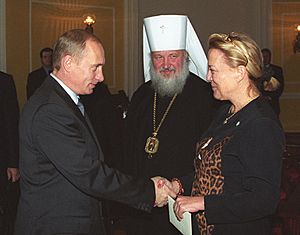
- On 14 March 1976, Kirill became a Bishop.
- On 2 September 1977, he was promoted to the rank of Archbishop.
- From 1984, he was Archbishop of Smolensk and Vyazma.
- From 1986, he also managed churches in the Kaliningrad Region.
- From 1988, he became Archbishop of Smolensk and Kaliningrad.
- On 13 November 1989, he was put in charge of the church's foreign relations and became a permanent member of the Holy Synod.
- On 25 February 1991, Archbishop Kirill was elevated to the rank of Metropolitan.
Kirill was given many important tasks by the Church's leaders. These included:
- Leading the Leningrad Diocesan Council from 1975 to 1982.
- Being a member of the World Council of Churches' main committees for many years.
- Helping to prepare for the 1000th anniversary of Christianity in Russia.
- Being part of a group that helped people after the Chernobyl accident.
International Connections
On 20 October 2008, during a trip to Latin America, Kirill met with Fidel Castro, the leader of Cuba. Castro praised Kirill. Kirill gave Fidel and Raúl Castro an award for their decision to build the first Russian Orthodox Church in Havana. This church was built for Russians living there.
Becoming Patriarch of Moscow
On 6 December 2008, after the death of Patriarch Alexy II, the Russian Holy Synod chose Kirill to temporarily lead the church. On 27 January 2009, the church's main council, called the Local Council, elected Kirill as the new Patriarch of Moscow and All Rus'. He received 508 out of 700 votes. He officially began his role on 1 February 2009.
Working with Other Churches
Some people in the Russian Orthodox Church were concerned about Kirill's efforts to work with other Christian churches, a practice called ecumenism. However, in 2009, Kirill stated that there would be no changes to the church's beliefs when talking with the Catholic Church.
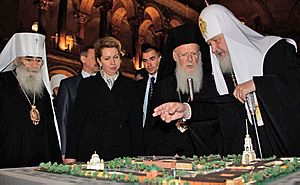
On 12 February 2016, Kirill met with Pope Francis, the head of the Roman Catholic Church, in Cuba. This was the first time a Pope and a Russian Orthodox Patriarch had met. They signed a joint statement about important global issues.
In 2019, Kirill also met with Paulose II, the head of the Malankara Orthodox Syrian Church. They discussed working together on things like church music and pilgrimages.
Church Changes
Patriarch Kirill made important changes to how the Church is organized. For example, in 2009, new church departments were created to handle different areas of activity. One new department was responsible for working with government bodies and other groups in society. Other changes included creating new ways to manage churches outside of Russia.
In 2011, the Holy Synod also created the Central Asian Metropolitan District. This changed how the church was structured in countries like Tajikistan and Uzbekistan. Also, since October 2011, many large church areas (dioceses) have been divided into smaller ones, forming what are called "metropolises."
International Relations as Patriarch
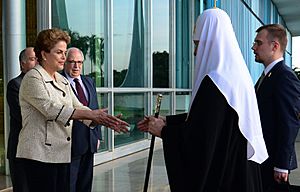
Kirill congratulated Belarusian leader Alexander Lukashenko after he won the Belarusian presidency in 2010.
When Russia took control of Crimea, Kirill did not absorb Crimea's churches into the Russian Orthodox Church right away. He also did not attend a ceremony in the Kremlin celebrating Russia's annexation.
In 2018, the Russian Orthodox Church, under Patriarch Kirill, decided to stop sharing communion with the Ecumenical Patriarchate of Constantinople due to disagreements about the Orthodox Church of Ukraine.
After Russia invaded Ukraine in 2022, Kirill praised the invasion. He said the conflict was caused by "gay parades" and made claims that Russians in Donbass were being "exterminated." These statements led some Orthodox clergy in other areas to criticize Kirill and seek independence from the Moscow church.
Relationship with Vladimir Putin
Kirill has been a long-time supporter of President Vladimir Putin.
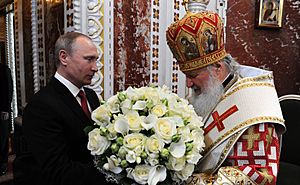
When Kirill was elected Patriarch in 2009, President Dmitry Medvedev and then-Prime Minister Vladimir Putin attended his enthronement ceremony.
The next day, Kirill spoke about his idea of how the church and state should work together. He said that the church and the Russian government under Vladimir Putin have worked very closely on cultural and social matters.
In 2012, Kirill spoke about the difficult times in Russia during the 1990s. He said that the 2000s, under Putin's leadership, were a "miracle of God" that helped Russia recover from a big crisis.
Patriarch Kirill has supported Russia's actions in Crimea and eastern Ukraine. While he has called for "speedy restoration of peace," he has also referred to those opposing Moscow in Ukraine as "evil forces."
Personal Life
Reported Wealth
Some reports have estimated Kirill's wealth. A 2006 Forbes article suggested it was around $4 billion. A 2019 report from Novaya Gazeta estimated his worth between $4 billion and $8 billion, though these figures have not been officially confirmed. A 2020 investigation also reported that Kirill and his relatives owned several properties in the Moscow Region and St. Petersburg.
In 2009, a photo of Kirill showed him wearing an expensive watch. Church officials later edited the watch out of the photo, but its reflection was still visible. Kirill initially said the photo was fake but later admitted he owned the watch.
Awards and Honors
Church Awards
- Russian Orthodox Church
- Order of St. Prince Vladimir 2nd class (1973)
- Order of St. Sergius of Radonezh, 1st and 2nd class
- Order of the Holy Prince Daniel of Moscow, 1st class
- Order of St. Innocent Metropolitan of Moscow and Kolomna, 2nd class
- Order of St. Alexis the Metropolitan of Moscow and All Russia, 2nd class
- Named Panagia (1988) – for his active role in celebrating 1000 years of Christianity in Russia
- Order of Saint Anthony and Theodosius of the Caves, 1st class (UOC-MP, 2006)
- Order of Saint Stephen the Great, 2nd class (Orthodox Church of Moldova, 2006)
- Silver Jubilee Medal of St. Apostle Peter (St. Petersburg diocese, 2003)
- Order in honor of the 450th anniversary of the Pochayiv Volyn icons (UOC-MP, 2009)
- Order of St. Theodosius of Chernigov (Ukrainian Orthodox Church, 2011)
- Awards from other Orthodox Churches
- Orders from Alexandria, Antioch, Jerusalem, Georgian, Serbian, Bulgarian, Hellenic, Poland, the Czech Lands and Slovakia, Finland and America.
- Order of the Holy Apostles Peter and Paul, I degree (Antiochian Orthodox Church, 2011)
- Gold Medal of St. Innocent (2009, The Orthodox Church in America)
- Awards from other Christian groups
- The Order of St. Gregory of Parumala (Malankara Orthodox Syrian Church, India, 2006)
- Order of St. Gregory the Illuminator (Armenian Apostolic Church, Armenia, 2010)
- Order "Sheikh ul-Islam" (Caucasian Muslims Office, 2011)
Awards from Russia
- Order of Merit for the Fatherland;
- 2nd class (2006) – for his big contribution to spiritual and cultural traditions
- 3rd class (2000) – for helping to strengthen peace and revive spiritual traditions
- Order of Alexander Nevsky (2011) – for his important role in preserving spiritual and cultural traditions
- Order of Friendship (1995) – for his services to the state and helping with building projects in Moscow
- Order of Friendship of Peoples (1988)
- Medal "50 Years of Victory in Great Patriotic War of 1941–1945."
- Jubilee Medal "300th Anniversary of Russian Navy" (1996)
- Medal "In memory of the 850th anniversary of Moscow" (1997)
- Gratitude of the President of the Russian Federation (1995) – for helping with the 50th anniversary of Victory in World War II
- Diploma of the State Duma of the Russian Federation (2001)
Foreign Awards
- Order of Honour (Azerbaijan 2010)
- Order of the Republic (Moldova, 2011)
- Medal "65th anniversary of Victory in Great Patriotic War" (Transnistria, 2010)
- Order of the Republic of Serbia (2021)
Honorary Citizen Titles
Kirill has been made an honorary citizen of several places, including:
- Lukoyanovsky District (2000)
- Smolensk Oblast (2009)
- Kaliningrad Oblast (2009)
- Kemerovo Oblast (2010)
- Smolensk (2003)
- The selo of Rizskoye (2004)
- Neman (2006)
- Vyazemsky District (2006)
- Kaliningrad (2006)
- Khoroshyovo-Mnyovniki District of Moscow (2006)
- Republic of Mordovia (2011) – for his important work in preserving spiritual traditions and strengthening the relationship between church and state.
See also
 In Spanish: Cirilo de Moscú para niños
In Spanish: Cirilo de Moscú para niños
- List of metropolitans and patriarchs of Moscow
 | Calvin Brent |
 | Walter T. Bailey |
 | Martha Cassell Thompson |
 | Alberta Jeannette Cassell |


